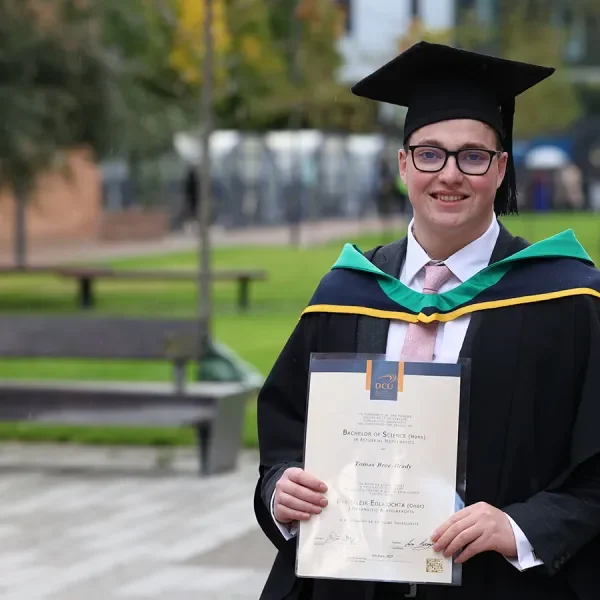Overview
Actuarial Mathematics could be the perfect course for you. It’s accredited by the Institute and Faculty of Actuaries, UK, meaning you may be exempt from some of the exams needed to qualify as an actuary in Ireland and the UK.
Before you embark on learning essential actuarial knowledge and theories, you’ll be given solid mathematical training. In your first two years, you’ll study the fundamental mathematical principles that underpin the actuarial and financial models covered in later years. You’ll also study computer programming, economics and accounting.
Preparing for the real world
In third and fourth year, you’ll apply sophisticated mathematical techniques to real-world problems in insurance, finance and banking. During the course, you’ll also come to understand the actuarial and financial industry, and gain the state-of-the-art skills and techniques needed to work in it.
In third year, you’ll do an eight-month paid INTRA placement in the actuarial or financial industry. This could be in a large insurance company, an actuarial consultancy, an investment bank or a trading house. Once you graduate, you’ll find rewarding employment as an actuary, working in financial services or as a data scientist.
Why DCU
DCU People

During his time studying at DCU for the BSc Actuarial Mathematics Tomás combined his love of maths with an active social life through the DCU Weightlifting Club.
Read more about Tomás Broe-Brady

DCU was the only college offering entry into Actuarial and Financial Mathematics when Aisling Crean-Lynch was unsure if “the BSc in Actuarial Mathematics would be a good fit for me.”
Read more about Aisling Crean Lynch

DCU has been an absolutely fantastic aid to my learning. The course can be very challenging at times, no doubt about it. It can involve abstract thinking and concepts that are often brand new.
Read more about Ava McKee

From a young age in Hong Kong, I loved mathematics and found satisfaction when I solved problems or finished mathematical exercises.
Read more about Kwok Chuen (Ryan) Wong
Careers & Further Options
Careers
The BSc in Actuarial Mathematics provides an excellent start to a career as an actuary or in finance.
Students who perform sufficiently well on the degree may be exempt from some or all of the Core Principles examinations (CS1, CS2, CM1, CM2, CB1, CB2) of the Institute and Faculty of Actuaries, UK and can, therefore, significantly reduce the time taken to qualify as an actuary.
The Actuarial Profession is a global profession with opportunities internationally in America, Asia, India, Africa and Australia.
Graduates are also well placed to undertake further studies and research in actuarial science, mathematics, financial mathematics, economics and finance.
Graduates can look forward to a rewarding and varied career with opportunities in all areas of the actuarial profession as well as certain areas of business and finance.
DCU graduates are highly sought after by employers. Our Graduates work in environments ranging from large multinationals to SMEs, family businesses and start-ups across every sector.
DCU Careers Service has a number of learning and development initiatives in place for our students, giving them the skills they need for a successful career path.
Entry Requirements
In addition to the general entry requirements for admission to the university the following entry requirements apply
Minimum of H3 in Mathematics
In addition to the general entry requirements for admission to the university the following entry requirements apply
GCE A Level B Mathematics
No Entry Path
Mature entry is a competitive process. Applicants must demonstrate:
- a genuine interest in the programme(s) they are applying for
- academic experience and competency in their chosen field of study
- an ability to engage and succeed on the programme
All applicants must complete a statement of interest to be considered for the mature application route.
For further guidance on the mature application process please see the CAO Website
Applicants that have completed at least one year of study at NFQ Level 6, 7 or 8 at another institution may apply to continue their studies on a similar programme at DCU. There should be substantial overlap in content between the two programmes to be considered for a transfer. Results and other supporting documentation must be submitted to CAO by the closing date of 1st July. This is a competitive application process for a small quota of advanced entry places. Offers are made on a rolling basis until all places are filled. Early application is advised. Please note: Applicants should also consider applying through the appropriate route for first year entry to the programme they are interested in. This application process is only for advanced entry.
Additional Criteria
Certified qualifications that cover all or most modules in Year 1 of our programme are essential for admission to the second year. Solid mathematical skills at university level must be demonstrated for consideration for advanced entry.
Accreditation
This programme is accredited by the Institute and Faculty of Actuaries (IFoA), UK, meaning you may be exempt from some of the IFoA subjects needed to qualify as an actuary in Ireland and the UK. Students who are admitted to via advanced entry may miss essential modules associated with exemption from IFoA subjects, causing their ineligibility to gain these exemptions.
International candidates are expected to have educational qualifications of a standard equivalent to those outlined above. In addition, where such candidates are non-native speakers of the English language they must satisfy the university of their competency in the English language. For further information on international applications click here.
Course Structure
- Mathematical Analysis
- Probability
- Computing for Mathematics
- Linear Algebra
- Microeconomics
- Sequences and Series
- Calculus
- Macroeconomics
- Statistics
- Calculus
- Financial Mathematics
- Numerical Methods
- Analysis
- Differential Equations
- Probability
- Accounting
- Actuarial Modelling
- Stochastic Modelling
- Financial Mathematics
- Accounting
- Financial and Actuarial Models
- INTRA
- Life Contingencies
- Financial Economics
- Time Series
- Simulation for Finance
- Deep Learning
- Probability and Finance
- Stochastic Finance
- Optimisation
Fees and Funding
Fees
How To Apply
Applicants presenting EU School Leaving/FETAC Level 5 examinations: Apply through the Central Applications Office (CAO) by 1st February or 1st May
To apply for this programme:
Candidates should apply directly here. Here's a quick step by step guide if you need help with your application.
Please provide
- Academic Transcripts for each and every year of study with English translation, if applicable.
- If applicable, provide evidence of competence in the English language as per DCU entry requirements.
Applications are accepted on an ongoing basis up to 1st July. All Non-EU candidates are advised to apply early, as places are limited.
All mature applicants apply through the CAO by 1st February. For further information and for special application procedures for mature students, please click here
EU Applications are made via the CAO Advanced Entry route which opens on 5th November until 1st July.
Please see Application Procedures or E-mail ugadmissions@dcu.ie.
Candidates required to apply through the CAO can apply online at cao.ie
Life On Campus
At DCU, our students can expect a unique campus experience. We are known for our excellent teaching and learning facilities, our active clubs and societies, and our great social and sporting facilities. All this makes DCU an exciting place to be.
DCU has three academic campuses; Glasnevin, St. Patrick’s and All Hallows (both in Drumcondra), all close to Dublin City centre.
They can be reached by public transport, Dublin Bus and Bus Éireann, with our Drumcondra campuses a ten minute walk from Drumcondra Train Station. Glasnevin is a 20 minute walk from St Patrick’s and All Hallows. They are also linked by Dublin Bus.
Each campus has a library (O’Reilly, Cregan and Woodlock Hall), study spaces, restaurants, and on-campus residencies. There are sports facilities on Glasnevin and St. Patrick’s, and there is a dedicated sports campus, St Claire’s, located near Glasnevin on the Ballymun Road.
DCU’s 19,000 students have access to exceptional teaching and learning facilities across our three academic campuses.
These include modern learning theatres, research centres, a new media and TV studio, radio/podcast studios, computer suites and advanced labs in the areas of Languages, Engineering, Physics, Chemistry and Biotechnology, as well as a Sports Performance centre and a training hospital ward. In 2021, we opened our first virtual reality ‘Leadership Lab’, which is located in our Business School.
We continue to improve and update our facilities. For example, construction of a new world-class STEM facility is underway on the Glasnevin campus. With capacity for an extra 3,000 STEM students, this facility will advance DCU’s international reputation for excellence in science and health, computing and engineering disciplines.
Studying in DCU isn’t just about course work. The university is rich in student life and activities.
There are more than 140 clubs and societies for students in DCU, with ‘Clubs & Socs’ days taking place on both the Glasnevin and Drumcondra campuses at the start of the academic year. They span everything from rugby to rock climbing, anime to jazz.
For many students, sport is an important part of the DCU experience. DCU’s Sports Complex boasts a 25 metre swimming pool, fitness centre gym, all-weather pitches and squash courts, as well as soccer, GAA and rugby pitches. DCU Dóchas Éireann, the university’s GAA club, is the largest third level Gaelic Games club in the country. Meanwhile, DCU Athletics has been Ireland’s highest achieving university club for many years. And DCU has dozens of other clubs to get involved in, from Archery to Weightlifting.
The Glasnevin campus is home to our purpose built, state-of-the-art student centre, The U, which serves the needs of a rapidly growing student body. Here, you will find the Student Leadership and Lifeskills Centre, performing arts and cultural spaces for students and the wider community, and the Entrepreneurship and Innovation Hub. Also located on our Glasnevin campus is The Helix, our renowned performing arts centre.
On our St Patrick’s campus, we have the Java Student Hub, a vibrant, warm and welcoming space where students can meet for coffee, play music, use the projector to watch events, or just relax. The walls of the Java Hub were designed based on the cultural history of St Patrick’s Campus, including the special references to the notable sporting history and history of the arts.
We have a number of academic, professional and social supports for students.
Student Advice & Learning Skills Centre - Offers a wide range of supports and services to students and advice
The Writing Centre - drop-in writing workshops for students through the academic year
Maths Learning Centre - provides maths support for students of all ability levels with maths modules
Student Learning - facilitate the transition from passive to active learning for students at DCU, by teaching study skills, nurturing critical thinking and building student confidence.
Careers work with students to help them on their professional journey into graduate employment.
Our student support team offers a comprehensive support programme, helping students make that all important transition into university life and focusing on building confidence and skills which are key to success at third level.

DCU Glasnevin Campus
FAQs
What is actuary?
Actuaries work with other people using mathematics (and computing) to solve problems related to financial risk. Very often they work in insurance companies, working on such things as calculating insurance payments of different kinds, pensions and financial risk management - helping individuals and companies to plan for their financial future. They earn very good salaries (starting at c. €35K, with a significant jump when they complete their professional qualifications), and work in a stimulating and challenging environment that has lots of different career opportunities.
Is DCU all one campus?
DCU is a multi campus university - the Glasnevin, St Patrick's and All Hallows campuses. The St Patrick's campus is where the Education courses are taught and some of the subjects from the BA Joint Honours degree. There is a 20-25 minute walk between the campuses but there are buses and bikes available to go between them also.
Click here to see maps of all of our campuses
If I'm studying on the St Patrick's campus, can I use the library and sports centre on the Glasnevin campus?
Yes, all facilities such as sports and accommodation are open for all DCU students to avail of.
Are there libraries in DCU and if they have wifi and work stations?
We have a brand new state of the art four floor library on our St. Patrick's Campus which complements the existing library on the Glasnevin campus. There is free wifi, work stations as well as desktop computers.
Does DCU provide accommodation?
DCU does have on-campus accommodation for undergraduate and postgraduate students, and you can find out more and apply via the Accommodation Office webpage.








